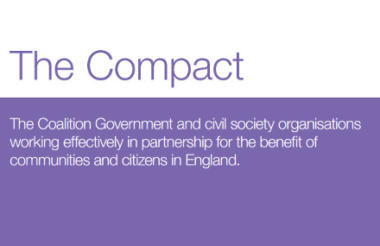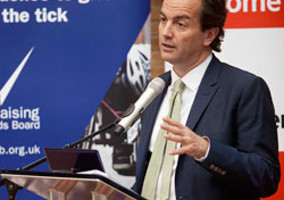There have been renewed calls to renew the Compact. Kirsty Weakley takes a look at what it actually means.
Have you ever nodded and agreed fervently whenever clever people in the charity sector talk seriously about the Compact, and especially when they talk about the Compact being broken?
Well I have, and I suspected others have too. In brief, it's the agreement between charities and the government which is intended to deliver fair funding agreements and freedom for charities to campaign, among other things. But how many people know it exists or how it works?
I asked this question using a Twitter poll and 73 people responded. Just 40 per cent said that they were confident in their understanding of it.
This feels pretty low, especially considering that anyone who has chosen to follow a charity trade press journalist is likely to be quite engaged with these issues.
When I first started writing about charities five years ago it felt like every day there was a story about the Compact – people talked about it a lot, and everyone seemed to know what it meant.
But then we all stopped talking about it. Maybe this was because they had run out of things to say. Or maybe, as some suggested, the Compact was dead?
Then people started talking about it again. Last week Sir Stuart Etherington said he would like the next government to “recommit to the Compact” and today Acevo’s chief executive, Vicky Browning, also called on the government renew its commitment to the Compact.
This is quite a key change. While government is nominally bound to the Compact, this requires civil servants to know it exists and at present, most don't.
In every story we include one line of explanation saying that the Compact is “the agreement between the voluntary sector and the government” in each news story that we write, but I’m not sure that’s quite enough, especially for anyone new to the sector (or just those of us with really poor memories).
What is it?
The Compact is a 16-page document setting out ways the government and voluntary sector. It was last renewed in 2010 and is signed by the then Prime Minister, David Cameron, and then Deputy Prime Minister, Nick Clegg, as well as the minister for civil society and Simon Blake, then chair of Compact Voice.
There are commitments about how the government and charity sector will behave under five key headings:
- A strong, diverse and independent civil society
- Effective and transparent design and development of policies, programmes and public services
- Responsive and high-quality programmes and services
- Clear arrangements for managing changes to programmes and services
- An equal and fair society
Included in the commitments from government is to “Respect and uphold the independence of civil society organisations (CSOs) to deliver their mission, including their right to campaign, regardless of any relationship, financial or otherwise, which may exist.”
It’s important to note that it is a two-way agreement with parts setting out how charities will behave.
For example civil society committed to: “When campaigning or advocating, ensure that robust evidence is provided, including information about the source and range of people and communities represented.”
The government also commits to being “transparent” when designing public services.
It is expected that charities will put forward ideas which “focus on evidence-based solutions, with clear proposals for positive outcomes”.
Most areas are also covered by local compacts between voluntary groups and local authorities.
You can read the document in full here.
How long has it been around?
The first national Compact was first introduced in 1998 after being recommended by an independent commission into the future of the voluntary sector, chaired by Nicholas Deakin.
The first version was produced by the Home Office and a steering group, following a postal consultation with 20,000 community groups.
It was refreshed in 2009 and then renewed in 2010 when the coalition government was formed.
Who runs it?
Until 2011 a Commission for the Compact oversaw the agreement, but it was abolished and the role split between the Office for Civil Society and Compact Voice.
Every government department is nominally signed up to the Compact and the Office for Civil Society has been charged with overseeing its implementation.
Compact Voice, which sits within NCVO, acts as the voluntary sector’s champion on compact issues and its website hosts resources for improving relationships between voluntary and public sector bodies, as well as a map showing where local compacts are in operation.
Its board comprises of representatives from across the voluntary sector and it has carried out various pieces of research into the state of Compacts.
However its website has been noticeably quiet of late – the most recent entry on its blog is dated March 2016.
What next?
The next government’s focus is likely to be Brexit, Brexit and more Brexit (unless, of course, the Liberal Democrats pull off an unlikely victory) so any demands on the government’s time and energy need to bear this in mind and frame the argument in such a way.
Sector leaders have been vocal in calling for action from the government to renew and refresh the Compact. They need to be clear with the sector about what this would mean.
Any such renewal of the Compact would essentially be a symbolic gesture – it’s no big secret that relations between the sector and the government have been somewhat strained until recently, so a visible sign that everyone has moved on could be a welcome step.
However it must be complemented with concerted efforts to make sure that charities and commissioners alike understand their responsibilities.
It’s vital that the sector’s leadership explains what this means. So umbrella bodies mustn’t forget to explain what this mean for charities, both in terms of what they can expect from government and what government expects from them.
And it's important we reach out to the civil service, too. You can't get them to follow this agreement unless they know what it is.
|
Related articles










